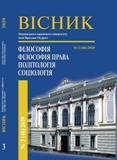ЗНАЧЕННЯ КРИТИЧНОГО МИСЛЕННЯ У ЖИТТІ СУЧАСНОГО СУСПІЛЬСТВА
THE IMPORTANCE OF CRITICAL THINKING IN THE LIFE OF THE MODERN SOCIETIES
Author(s): Diego Felipe Arbeldez-Campillo, Vasyl Yakovych Tatsiy, Rojas-Bahamon Magda Julissa, Oleg Gennadiyevich DanilyanSubject(s): Political Philosophy, Social Philosophy
Published by: Національний юридичний університет імені Ярослава Мудрого
Keywords: critical thinking; globalization; political discourse; legal reality; democratic culture; Latin American philosophy;
Summary/Abstract: Problem setting. Critical thinking is an attribute of consciousness that can be manifested in all human activities where it is required, as a condition of possibility, in the use of critical reason and deliberation. Consequently, it is in the domains of politics that critical thinking is used more frequently, to discuss the scope and concrete significance of the discourses and practices that, from the exercise of public powers, are deployed on intelligent citizenship and with the minimum necessary of information for peer deliberation. Recent research and publications analysis. The term «critical thinking» itself is inextricably linked with the concept of «criticism. The Modern Dictionary of Social Sciences defines the term «criticism» as «a way of spiritual activity, the main task of which is to give a holistic assessment of the phenomenon, revealing its contradictions, strengths and weaknesses». Critical thinking is understood as a system of judgments, which is used to analyze things and events with the formulation of sound conclusions and allows us to make informed estimates, interpretations, and also apply the results to situations and problems. According to a number of researchers (Palacios, Alvarez, Moreira, and Moran, 2017), critical thinking is a type of reasoning that can be defined differently, but most of these reasoning always have something to do with the act of a survey or assessment. For this reason, speaking of critical thinking in general terms, references are made to questions and assessments, which ultimately make it possible to express a judgment or substantiate a position regarding a fact, phenomenon or idea. There is a position that the transition to a critical level of thinking in a particular community is a necessary prerequisite for the beginning of the civilized development of this community. Paper objective. The objective of this article is to deconstruct the most common contributions of critical thinking, as a form of participation and political deliberation. It is about investigating what it implies for a social actor or political subject to think critically, by reviewing different theoretical and legal developments, which have been propping up dialectically in the West, since the advent of the philosophical program of political modernity, a culture of critical thinking that subsumes to different notions such as: freedom of conscience, freedom of expression, autonomy of the person, rights of resistance to oppression and free development of personality. Methodology. Methodologically it is a research of documentary design developed in the coordinates of the philosophical essay, next to the Latin American philosopher and the revision of the most popular political theory. Paper main body. Democracy is the natural space of critical thinking. In it, the individual - and beyond, the social movements - find the basic conditions for the development of criticality: freedom (recognition in the legal plane of freedom of thought and expression), and the possibility of dissenting in order to seek social change. In this sense, critical thinking is not the exclusive patrimony of a progressive or conservative ideology, but of every person and social group that, in a context of democratic exercise, think about the established order and its transformation. Totalitarian systems repress critical thinking, and although they do not cancel it due to the resistance of some dissenting voices, they prevent it from becoming generalized in the population. The change or conformation of an order of justice, equality and participation, aspiration present in the critical vision of society, is replaced in totalitarianism (either from the right or from the left) by an ideology of control, where freedom is curtailed, to sow in the population the belief in a non-existent functional order, when in reality it is devoid of a minimum of rationality. Democratic systems, in contrast to totalitarian systems, promote freedom of expression and recognize the right of citizens to think differently from what is considered normal in society. In this way, critical thinking does not represent a threat to democracy, but is part of it; while for totalitarianism, it is simply subversive and dangerous. Conclusions of the research. Among the main findings, the idea that critical thinking is not the exclusive patrimony of certain self-defined political and ideological tendencies as progressive in the region stands out. It is concluded that, this way of thinking is uncomfortable perse for all the paradigms that serve as the basis for the status quo, in politics and society.
Journal: Вісник НЮУ імені Ярослава Мудрого. Серія: Філософія, філософія права, політологія, соціологія
- Issue Year: 46/2020
- Issue No: 3
- Page Range: 11-27
- Page Count: 17
- Language: Ukrainian

